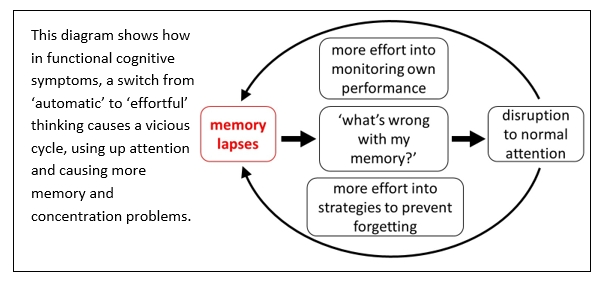I have just been reading the neurosymptoms.org.uk website section on functional cognitive symptoms "brain fog":
neurosymptoms.org/en/sympto...
This image was recently shared with me.
By changing our behaviours (shutting down, withdrawing etc) to an embarrassing moment of memory loss, we can break the circle and reduce the distress which turns on our sympathetic nervous symptom (freeze, flight, fight response).
This is Josh’s story:
Josh is 28 and works as a teaching assistant in a special needs school. At work, he was accidentally hit on the head with a table that another staff member was moving into the hall. He was not knocked out, but felt dazed for several minutes after the injury.
For the next few days, he noticed headaches, dizziness and poor concentration. He was sensitive to bright lights and felt extremely tired. He took some time off work to rest. Over the next few weeks, the dizziness went away, his headaches reduced, and he was able to get back to work.
Back at work, he continued to struggle with his memory and concentration. He had previously had an excellent memory, but now found he was forgetting tasks unless he kept a list. After talking to a colleague, he would often realise that he had forgotten most of the details from their conversation. He sometimes called the children in his class by the wrong name, even though he knew them well. He had a sense of “brain fog”, as though he wasn’t quite himself. His thinking was slower, and everything seemed like more of an effort.
The symptoms were worse on days when he had slept badly, or had a headache, but he never felt completely well. By the time he got home from work every day he felt exhausted.
He found these difficulties very frustrating, and was worried about whether he might have damaged his brain in the accident. His GP told him the symptoms could be due to stress or depression, but he liked his job and did not feel depressed.
Josh saw a neurologist who explained that his symptoms were typical of functional cognitive disorder. He was surprised as he had been concerned that his memory problems had been caused by brain damage and might never improve. The neurologist explained that pain and poor sleep interfered with the brain’s ability to focus. He got some helpful tips from a leaflet about improving his sleep.
When they looked together at Josh’s activities, they noticed that he tended to ‘overdo it’ on the days when he felt ‘ok’, and this left him exhausted.
Josh spoke to the school and negotiated some changes in his hours and responsibilities so that he could gradually build up his activity level at work without this “boom and bust” pattern.
Over time Josh’s energy levels improved, and everything started to feel a bit easier. He still sometimes called children by the wrong name, but he noticed that everybody did this sometimes and he no longer felt worried or embarrassed when it happened.
